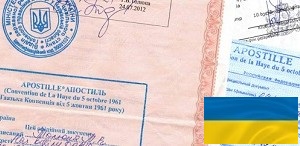Apostille in Ukraine on documents of citizens and companies. Certification and apostille of documents from government bodies and other institutions. Apostille on a certificate, extract from the civil registry office, education documents, police clearance certificates, notarial documents, sentences and court decisions.
The Hague Convention abolishes the requirement of diplomatic or consular legalization of official documents for members of the convention and replaces this procedure with an apostille stamp. Documents for submission to the official bodies of other countries (parties to the Convention) are certified in a special, simplified procedure: the authorized bodies of Ukraine put a special stamp - Apostille, which does not require the certification or legalization and is recognized by the official bodies and institutions of the countries parties to the Convention.
Apostille of documents - apostille in Ukraine:
Apostille in Ukraine is a special stamp that is placed on the official documents of the countries - members of the Hague Convention and does not require further certification of documents. The apostille certifies the authenticity of the signature and the position of the official who signed the document, as well as the authenticity of the seal or stamp with which the document is certified. We provide a service of certification of documents with an apostille abroad. We provide services for the translation of apostilled documents into a foreign language and notarization of the translation of the document.
The Convention applies to documents in Ukraine: documents on education, acts of civil status, documents on work experience, certificates, powers of attorney, court decisions, and materials on court cases. The provisions of the Convention do not apply to documents issued by diplomatic missions or consulates of foreign states, administrative documents on commercial secrets, customs operations (powers of attorney for transactions, movement of goods across the border, contracts for the supply of goods and services, contracts for work, and others.
Apostille is placed on the statutes, constituent documents, patents, and other documents issued by state authorities or administration (registration certificates, licenses, certificates, etc.). Apostille is not put on: originals, copies, and photocopies of passport documents, military cards, workbooks, permits to carry weapons, certificates of registration of vehicles (technical passports), identity cards, regulatory legal acts, explanations and legal grounds, documents bearing the nature of the correspondence. Apostille is not placed on documents issued by foreign diplomatic institutions of Ukraine and on administrative documents related to commercial or customs operations.
Originals of documents issued by state institutions of the former republics of the USSR cannot be accepted on the territory of Ukraine for an apostille, and therefore, before affixing an apostille on these documents, you need to obtain a new type of documents.
Bodies that affix the apostille: by the Ministry of Education and Science of Ukraine - on educational documents and official scientific documents issued by educational institutions, state bodies, enterprises, institutions, and organizations (on a diploma of education, certificate of academic title, certificate, a certificate from educational institutions, etc.); By the Ministry of Justice of Ukraine - on documents issued by the justice authorities and courts, on documents drawn up by Ukrainian notaries (on certificates and certificates from the registry office, documents issued by notaries, court decisions and certificates); By the Ministry of Foreign Affairs of Ukraine - on all other types of documents.
The Consular Service Department of the Ministry of Foreign Affairs of Ukraine accepts documents for apostille: archival certificates from the archives of Ukraine; documents from the registry office; notarial statements (certificate of marital status); health certificates; certificates from the bodies of the Ministry of Internal Affairs of Ukraine (police clearance certificate); other official documents.
Countries of the 1961 Hague Convention on the Abolition of the Legalization of Foreign Public Documents (apostille): Australia, Austria, Azerbaijan, Albania, Andorra, Antigua and Barbuda, Argentina, Bahamas, Barbados, Belize, Belgium, Belarus, Bulgaria, Bosnia and Herzegovina, Botswana, Brunei, Venezuela, Armenia, Honduras, Grenada, Greece, Georgia, Dominican Republic, Ecuador, El Salvador, Estonia, Israel, India, Ireland, Iceland, Spain, Italy, Kazakhstan, China, Hong Kong, Macau, Cyprus, Colombia , Korea, Latvia, Lesotho, Lithuania, Liberia, Liechtenstein, Luxembourg, Mauritius, Macedonia, Malawi, Malta, Marshall Islands, Mexico, Moldova, Monaco, Montenegro, Namibia, Netherlands, Niue, New Zealand, Norway, Cook Islands, Panama, South Africa (South Africa), Poland, Portugal, Russian Federation, Romania, Samoa, San Marino, Swaziland, Seychelles, Saint Vincent and the Grenadines, Saint Kitts and Nevis, Saint Lucia, Serbia and Montenegro, Slovak Republic , Slovenia , United Kingdom of Great Britain and Northern Ireland, United States of America, Suriname, Tonga, Trinidad and Tobago, Turkey, Hungary, Ukraine, Federal Republic of Germany, Fiji, Finland, France, Croatia, Czech Republic, Switzerland, Sweden, Japan.
The Consular Service Department does not legalize documents and does not apostille documents issued in foreign countries. For firms, documents for legalization are accepted with a letter of application on the company's letterhead with requisites and a seal.



